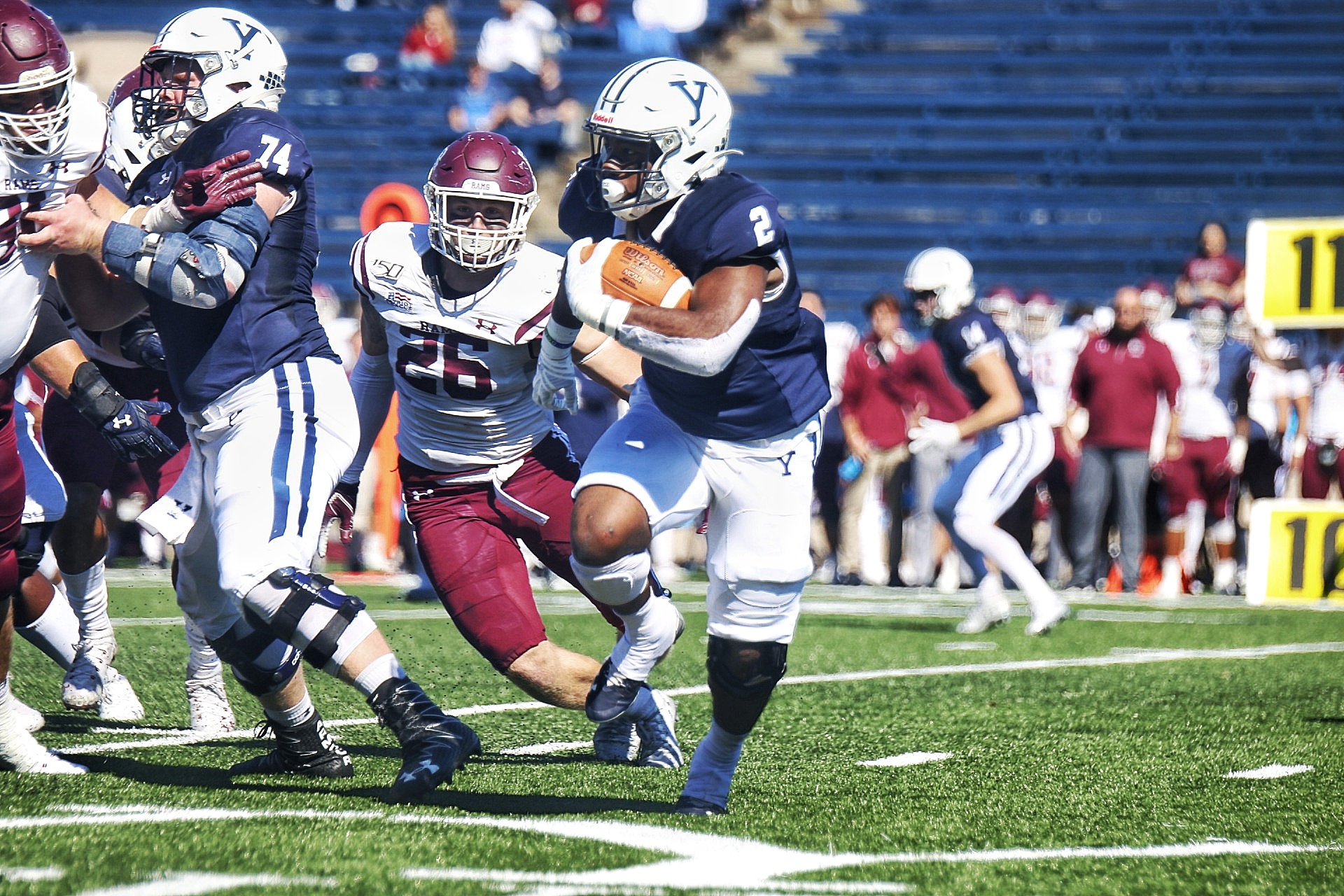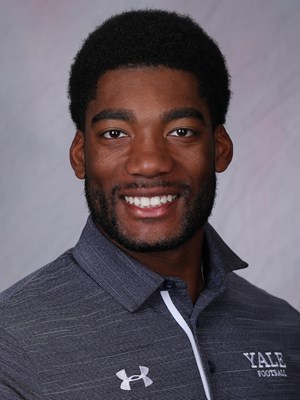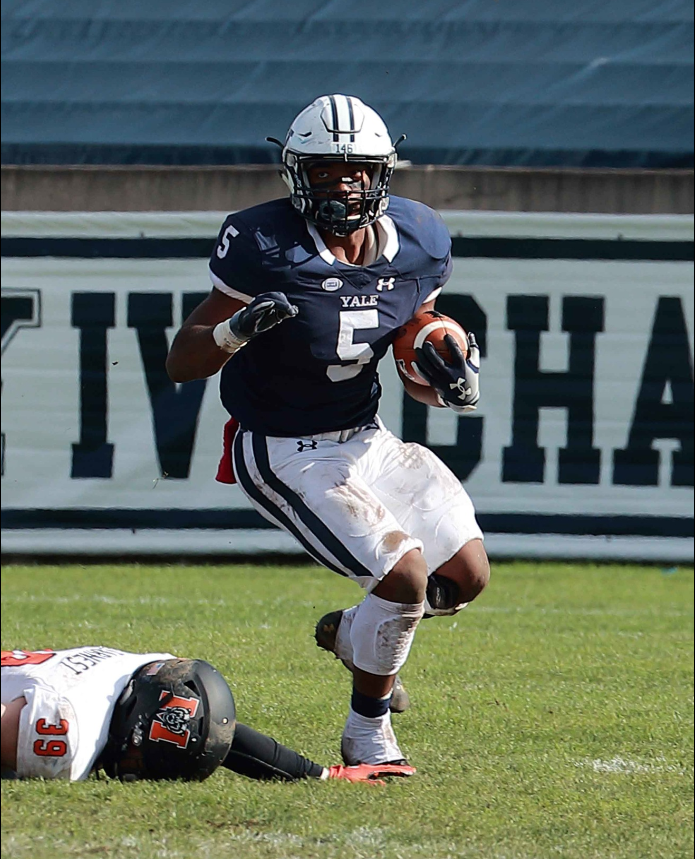FOOTBALL: A look back on the illustrious career of Alan Lamar ’21, and a look ahead to his plans in 2021
Despite the Ivy League canceling fall sports, running back Alan Lamar ’21 has not wavered in his determination to use his extra semester of eligibility — even if it means donning a different school’s uniform in the process.

Lukas Flippo, Photo Editor
While the cancellation of the fall Ivy League season has had a clear, lasting impact on every member of the Yale football team, perhaps no Bulldog had his football career thrown more off course than running back Alan Lamar ’21.
Successful doesn’t even begin to describe Lamar’s pre-collegiate years as a running back. A First Team All-State in high school, the highly sought-after athlete put up dominating numbers freshman through senior year, amassing an array of accolades in the process. After choosing to take his talents to New Haven, Lamar was an immediate contributor as a rookie, leading the team in both yards and touchdowns. The Mississippi native entered his sophomore campaign as an unquestioned starter and looked poised to have a season of dominance.
Then, suddenly, a few days before the Bulldogs’ season was set to kick off, Lamar’s season came to a devastating, shocking halt. During a seemingly innocent non-contact drill, Lamar, as described by head coach Tony Reno, took a bad cut. His ACL tore completely, and it would be a year before Lamar was finally able to step back onto the gridiron. All was not lost, however, as the Ivy League granted him an extra semester of football.
In the season that followed, any doubts surrounding Lamar’s ability to return to form were swiftly quelled as he went on to lead Team 146 in rushing yet again. A year later, Lamar — then a senior — was a crucial part of Yale’s Ivy League title run. At the season’s end, Lamar had a choice to make. He could either graduate the following spring or take advantage of his extra semester of eligibility as a redshirt senior. Lamar landed on the latter and took a leave of absence in the spring of 2020, delaying his graduation until December. Yet unbeknownst to Lamar, along with the rest of the country, unparalleled adversity was on the horizon, and Lamar’s plan to pursue football in 2020 would quickly go awry. As it stands now, Lamar has not wavered in his ambition to play another season of collegiate football, even if it means doing so in a different uniform.
“When the decision came out that we weren’t going to be playing in the fall, the first person I thought of was [Lamar],” Reno said. “He had to miss the whole 2017 season but then was able to come back to play in 2018 and was an instrumental part of our championship team last year. He was granted this fall semester in 2020 to recapture that season he missed. When the news came out about our season being canceled, my heart just sank for him. He was planning to come back and graduate with hopes to go play in the NFL and it really put him in a bad, tough spot.”

Early years
Lamar’s football journey began at DeSoto Central High School in Southaven, Mississippi. Accumulating 6,534 total yards and 77 touchdowns throughout his career, the running back won a myriad of awards.
He was an All-American, won First Team USA Today All-Mississippi Team and First Team All-State honors and was a two-time team MVP. That’s not to mention winning both the Shelby-Metro and the DeSoto County player of the year awards. In his senior year alone, Lamar rushed for nearly 2,400 yards and led every football player in the state of Mississippi, with 43 touchdowns.
“Alan Lamar is the poster child for what a student athlete should be and will be uber successful wherever he decides to go,” Jake Wimberly of the Mississippi Gridiron said back in 2015 after Lamar had completed his senior season. “There is no doubt we love to watch athletes perform, but we also want to see them make positive contributions to society long after their playing days are over and Alan Lamar is setting himself up to do that in a huge way.”
One of the highest-rated recruits in Mississippi, Lamar landed on the Elis as his collegiate destination in 2016, joining a core of running backs that included Dale Harris ’17, Candler Rich ’17 and Deshawn Salter ’18. After Yale dropped its first three games of the season, Lamar, who at that point had served primarily as a special teams contributor, was pressed into offensive action against Dartmouth. Lamar did not let this opportunity go to waste, immediately making a name for himself with 180 yards and two touchdowns in a 21–13 victory. Lamar’s performance did not go unnoticed by the FCS, nor by the Bulldogs coaching staff, with the former awarding him FCS Rookie of the Week accolades and the latter awarding him a role as the team’s starting back. Over the course of the next five games, Lamar tallied 377 yards and three touchdowns, for which he was awarded Second Team All-Ivy League honors.
Entering the 2017 fall season, Harris and Rich — two of the three running backs that comprised the Blue and White’s starting core — had graduated. Caden Herring ’20 and Alex Young ’20, the two running backs who had been recruited alongside Lamar, had switched to wide receiver and departed from the football program, respectively. While the Bulldogs would be adding a two-star recruit in Zane Dudek ’21 to their lineup of backs, Lamar entered his sophomore campaign as the unambiguous co-starter alongside Salter, and he seemed more than ready to continue his well-established trend of dominating on the field.
A Turning Point
A fateful scrimmage game against Brown a week before the season’s tipoff would change things. Right before the game was set to begin — a game that he was not slated to play any minutes in — Lamar decided to keep his legs loose by going through some non-contact drills. One bad cut later, and his ACL was torn. The Mississippian’s season had come to a crushing conclusion, as the Yale football coaching staff now had to contend with a running back core severely short on experience. Salter was named the starter, but it was Dudek who ultimately became the defining part of the Bulldogs’ 2017 Ivy League championship season.
The Pennsylvania native would finish the year leading not just the Ancient Eight, but the entire FCS in every rushing and scoring category in what is now widely regarded as the best rookie season a running back has ever enjoyed while wearing the Blue and White. While he could only watch Dudek’s historic season from the sideline, it was not all bad for Lamar, as Ivy League athletic officials granted him an extra semester of football eligibility.
Now fully healthy entering the 2018 season, reasonable questions emerged as to whether Lamar would be able to replicate his 2016 dominance coming off an injury. A week-three, 116-yard performance against Mercer put to rest any of those doubts. In the eight games that Lamar played in total, he racked up a team-leading 685 yards to go along with nine scores. Dudek, meanwhile, was forced to contend with injury bouts of his own — limiting him to only six games. At the season’s end, the Ivy League awarded Lamar First-Team honors — the cherry on top of what was an undoubtedly redemptive campaign.

In 2019, a fully healthy Dudek was given the starting role as Yale’s running back, taking away a good portion of Lamar’s snaps in the process. Nevertheless, Lamar finished the year with 229 rushing yards and was a contributor to Team 147’s successful run at the Ivy League crown.
Crossroads
Lamar’s football career had now reached a crossroads. He could choose to graduate in the spring along with the rest of the class of 2020. Or he could postpone his graduation for one semester — taking advantage of the extra semester of football that had been granted to him in 2017. Lamar went with the latter option, though it meant taking a leave of absence in the spring of 2020.
In the months that followed, however, things quickly took a turn for the worse. A health crisis would soon consume the globe, forcing the Ivy League to make a swift decision to cancel fall sports altogether in 2020. If Lamar wanted to salvage his extra semester of eligibility, it would have to be in the fall of 2021. Eligibility rules would also require Lamar to take the full year off. Rather than pursue that option, Lamar opted for something much different: a graduate transfer.
“The writing was on the wall already,” Lamar said, when asked to reflect on his initial reaction to the Ivy League canceling the season. “Before [the Ivy League] even made its final announcement that the fall season would be canceled, I was certain that I wasn’t going to play in 2020. I’m the kind of person that doesn’t try to dwell on things that I can’t control. Of course, I was sad and frustrated, but I channeled those feelings into trying to find another school that I could play football at for another year.”
As outlined under NCAA guidelines, if a student-athlete has earned an undergraduate degree without using up all of his or her athletic eligibility, that player has the option to play immediately at a new school as a graduate transfer. Ultimately, this was more alluring to Lamar than holding out for another year as a member of the Blue and White.
According to Lamar, he intends to graduate at the semester’s end this December. In the meantime, he and his family have been reaching out to coaches directly on social media asking whether they would be interested in taking a one-year all-purpose back.
“My father and I have been [direct messaging] a bunch of coaches on Twitter asking about their availability for a one-year running back,” Lamar said. “Being a graduate transfer is a lot different than coming out of high school as a recruit because, as a high school player, coaches see you as a person with a lot of potential that they can develop for four years. … Given this fact, I’d say that this process has been more difficult than it was for me in high school.”
If he is unable to transfer to a different school, Lamar is also open to the possibility of declaring for the NFL draft in April, after this semester ends. However, Lamar believes that an additional season of playing collegiate football would increase his chances of being drafted.
Of the three seasons that Lamar was healthy, he led the team in rushing twice.
Jared Fel | jared.fel@yale.edu







